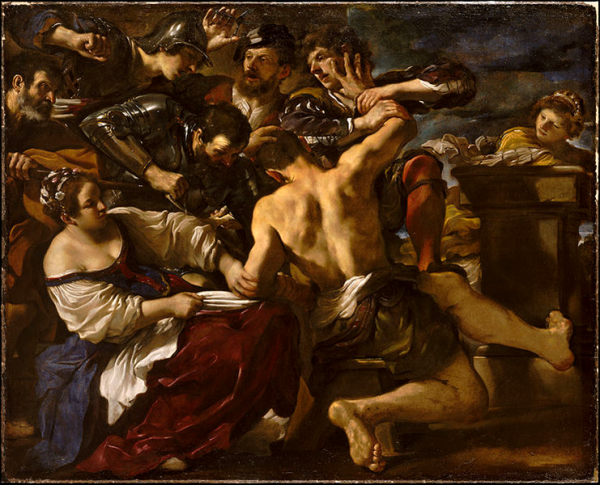Judging the Judges: Searching for Value in these Problematic Characters
When Yahweh decides to move on behalf of Israel, he ‘raises up’ (2.16; 3.9; 3.15; etc.) judges who will mobilize the people and lead them to freedom from bondage. Yahweh recruits human partners who serve in an active role of leadership, human partners who ‘succeed in restoring loyalty, solidarity, and the capacity for communal action among the people’.50 In spite of their weaknesses, even the most troubling of the judges are able to accomplish amazing and inspiring deeds as they pursue salvation and justice for their communities. The judges, therefore, are more than a reflection of the spiraling decline of Israel’s relationship to Yahweh; they are active participants in God’s work of salvation. As human agents who are raised up by Yahweh to bring deliverance to the Israelites, the judges register Yahweh’s response to the Israelites’ cries for help and his intervention on their behalf.51

Samson Captured by the Philistines, 1619, by Guercino.
Image: Wikimedia Commons.
The ministry of the judges, therefore, witnesses to the ‘important role of human agency in partnership with the redeeming activity of God.’52 In this role the judges are called ‘saviors’ (3.9; 3.15), who ‘save’ Israel (2.16; 3.9; 3.31; 6.14; 10.1; and 13.5). These saviors, however, do not act alone; they are Spirit-empowered leaders who challenge the community to action. At the behest of Deborah, Barak gathers a fighting force of 10,000 men. The Spirit of Yahweh clothes Gideon who subsequently sounds the trumpet and assembles an army (6.34). The Spirit of Yahweh comes upon Jephthah who travels throughout the region, calling the people together for battle. The judges are able to create a ‘renewal of the people’s unanimity and capacity for action, a renewal of the people’s power of resistance in the midst of universal despair’.53 What is commendable in the judges is their willingness to surrender themselves to God and to his saving mission, even when striving against overwhelming opposition. The judges respond in obedience to God’s call; and with God’s promise as their only assurance, they place themselves at risk in the battle to deliver Israel.
Theologically, the battle of the judges against the Canaanites represents resistance to oppression and life-negating forces of evil. The judges encourage us to pursue God’s continuing mission of liberation, equality, justice, and peace (cf. Isa. 11). The stories of the judges compel us to participate enthusiastically and sacrificially in God’s work of salvation. The mission of the judges is not far from that of Jesus the Messiah, who declared, ‘The Spirit of the Lord is upon me, because he has anointed me to bring good news to the poor. He has sent me to proclaim release to the captives and recovery of sight to the blind, to let the oppressed go free’ (Luke 4.18; NRSV).54
The endowment of the Spirit does not grant infallibility to humans.
Category: Biblical Studies, Fall 2010


